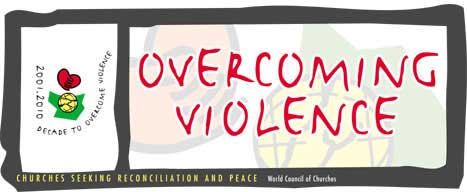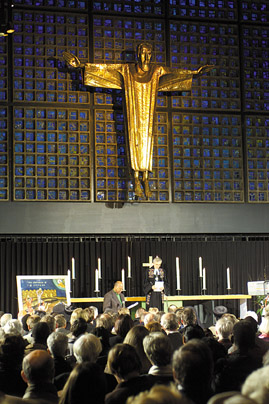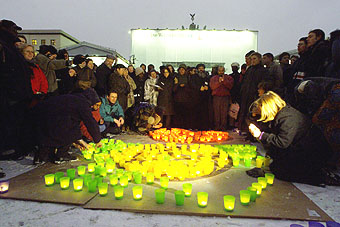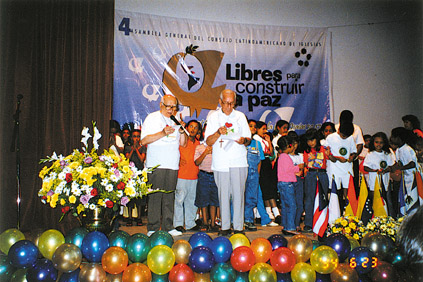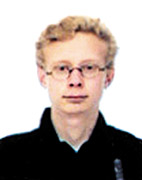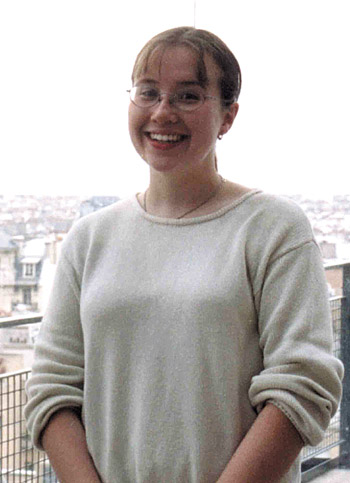|
Good news for global peace
More than a thousand students, academicians and community leaders gathered at St. Joseph’s Indian High School grounds in Bangalore, India, on 30 January 2001 to observe the World Day of Peace, the start of the Decade to Overcome Violence (DOV), and India’s Day of Martyrdom.
The theme of the public meeting, organised by Global Council of Indian Christians (GCIC), was "Good News for Global Peace", and the participants resolved to commit themselves to putting this theme into practice over the coming years, in the framework of the Decade to Overcome Violence.
National GCIC convener Sajan George says the theme is an interfaith initiative to promote peace in India, especially among youth. The interfaith element was evident at the public gathering, where Muslims, Hindus and Christian students proposed and discussed ideas to overcome violence.
The meeting encouraged students to send letters to India's head of state, challenging the government to abolish all weapons of mass destruction, to create a friendly atmosphere on the campuses of all the nation's academic institutions, and to curb domestic violence.
For more information e-mail |
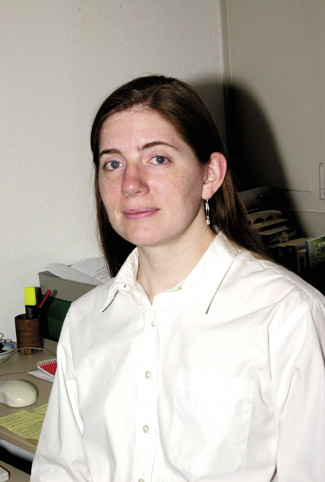
Laura Short
has recently joined the World Council of Churches as a consultant to the Decade to Overcome Violence. Laura will focus on networking for the DOV.
Laura comes from the United States and belongs to the Mennonite Church USA. She is seconded to the WCC by her church's Central Committee and by Mennonite conferences in Germany and the Netherlands.
Before joining the WCC, Laura worked for a computer software company in Goshen, Indiana as a technician/consultant and a technical writer. She looks forward to applying her skills and energy to the work of overcoming violence.
|
|
Cameroon campaign against war toys
"We cannot claim to build a society of peace and security, and at the same time nurture violence and war in our children." The argument advanced by the late Rev. Norbert Kenne, a member of the WCC Commission of Churches on International Affairs and founder of Cameroon's Ecumenical Service for Peace (ESP), was one of the key messages used during a campaign organised in early December 2000 in the nation's capital, Yaoundé, against war toys and firecrackers.
The decision to run the campaign was just one of many resolutions adopted at a two-day reflection on the "Proliferation of Small Arms and Light Weapons as a Threat to Peace and Security; a Challenge to Religious Authorities" held in Yaoundé last November. In Cameroon like many other places, it is common for shops as well as homes to be flooded with all sorts of war toys. Children play with them and watch violent films. They are thus conditioned to perceive violence as something normal, and acquire the necessary knowledge and skills to handle weapons, all of which contributes to building a culture of violence.
Reactions to the campaign were many and varied. Many toy shops were closed and the dealers complained of poor sales. In future, ESP has plans to mount another campaign, this time against violent films. The campaign will be targeted at video clubs throughout Cameroon.
For more information email
|
Mandela wins Methodist peace prize
Nelson Mandela, the former president of South Africa, was named the winner of the 2000 World Methodist Peace Award.The presiding bishop of the Methodist Church of Southern Africa, Mvuma Dandala, said Mr Mandela was "an icon of inspiration and hope for the people of South Africa, Africa and the world. He prevented South Africa from degenerating into a cauldron of violence and war."(ENI) |
 |
Overcoming violence in Palestine
Ghassan Andoni is the director of the Palestinian Centre for Rapprochement Between People. He expressed the following views in a telephone interview: "To overcome violence we need to stand firmly, for the victims and against the perpetrators".
The situation in the occupied Palestinian territories is drenched in violence. Hundreds have been killed, thousands injured, and hundreds of homes destroyed.
The Palestinian Centre for Rapprochement Between People (PCR), a WCC Peace to the City Network partner, has been actively engaged in countering violence and injustice by organizing campaigns to help rebuild bombarded homes in the city of Beit Sahour.
The "Displaced Shepherds" project, initiated by Rapprochement and implemented by young activists, is a model for community sharing and caring and a way to deepen the community service tradition among the younger generation. Channeling the energy of the youth into community service is essential for the prevention of urban violence, especially in schools.
The project is centered around a website used for advocacy and for accumulating needed resources to rebuild destroyed homes and accommodate displaced families.
With the participation of Palestinians, Israelis, and international representatives, Rapprochement recently organised a peaceful demonstration at the Israeli military base. This base was regularly shelling the city of Beit Sahour. Demonstrators asked the soldiers to leave the site. When the demonstrators left, a Palestinian flag was waving on top of the tower in the middle of the camp as a sign of solidarity.
Holding to the tradition of working together through such difficult times will positively influence the conflict and reduce the level of ethnic violence.
For more information e-mail
PCR website
International gold medal for Fiji peace film:
A documentary on peace-building efforts in Fiji made before the May 2000 coup has won the UNESCO gold medal award in the first annual New York Festivals Awards Competition for TV documentaries by producers from developing countries. The documentary entitled Where the Rivers Meet was commissioned in 1998 by the World Council of Churches’ Peace to the City Campaign. It was researched and produced by Dr ‘Atu Emberson-Bain, with camera and sound by Michael Rokotuiviwa Preston, who composed and performed the film’s original music.
Where the Rivers Meet is set against the backdrop of Fiji's 1987 military coups and a colonial legacy of ethnic division. It features the work of three civil society organisations to build cultural understanding, religious tolerance and respect for human rights. |
